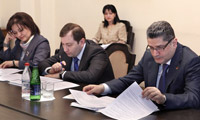Before elections almost all processes are discussed in relation to elections. The recent meeting in the government headed by PM Tigran Sargsyan to discuss issues connected with small and medium businesses was understood as if it was connected with elections too.
To be honest, such discussions have been organized before too and this is a normal working process. However, this time the PM gave political importance to the issue of small and medium businesses. “This council has a great mission to foster the small and medium businesses development in our country. The issue has political importance because if the small and medium business sectors fail to develop, we cannot build civil society. For this purpose we look at this issue not only as economic, but also as political issue,” said PM Sargsyan.
As we see, the PM did not mean the elections, but the civil society and democratic issues in the country, and other global issues.
Not to mention about elections does not mean yet that it is not connected with election, even indirectly. The groups involved in the small and medium businesses sectors are the largest electorate. There is no specific statistics but we can make approximate calculations. According to official statistics, there are over 80,000 registered private entrepreneurs. There are situations when large businesses hide behind several private entrepreneurs not to pay much tax, but most of the private entrepreneurs are small businesses. Small businesses are also among 8000 family and private enterprises, 44-45.000 limited liability companies. In consideration of this fact, the groups of small and medium businesses include several hundred thousand voters, including their families and employees. Solution of these problems or at least prevention of future problems may attract votes for the government. Development of small and medium businesses is important not only for the civil society, but also for stability and prevention of uprisings. It is logical that the government should be interested in it.
Whatever the reasons are the government has always spoken of supporting this sector and tried to convince that everything was being done for that purpose. This time the prime-minister spoke of developing the sector of small and medium businesses. “We must build strong grounds for the development of small and medium businesses. I believe that our joint work will show the way how we should solve the problems we have,” said Tigran Sargsyan. As the government’s official announcement writes, the small and medium businesses development council has presented a report on the works that have been done so far. The council informs that the government is subsidizing the expenses for small and medium businesses to acquire electronic signature. Instead of paying 13,500 drams, businesses can pay only 3,500 drams and have electronic signature. We cannot say that this is great support for small businesses because most of them, even don’t know what electronic signature is.
The next step is really demanded. The government will simplify the procedures for changing living apartments in buildings to business premises. According to this reform, the mentioned change will be done with a signature of the respective community head, but through a simple procedure. The goal of the reform is simplifying the mentioned procedures to make it easier to establish and make business.
The government will also discuss issues concerning collective cargo transportation in order to eliminate the problems in this process. The government promises to simplify this process to make business easier. It is not a secret that large transportation businesses are carried out by large and selected businesses. It is worth mentioning that this time the session of the government was not understandable as last year, because at that time the government touched upon 12 issues, which were not quite understandable. The problem was that 10 out of the mentioned issues discussed at that session did not concern small and medium businesses. For example, one of those issues was the tax law proposal to adopt a law on luxury tax.
Yesterday’s session was more understandable compared to the above mentioned. Certainly the information was poor, but this time there were almost no thesis. The only thing that remains without an answer is that whether ever the small and medium businesses will feel these differences or whether ever they will. “If you want to have a small business, you should establish a medium business and wait” – this is the theory that describes the situation with the small business sector in Armenia. The only thing small businesses expect from the government is their hope that at least the government will not create problems for them.

